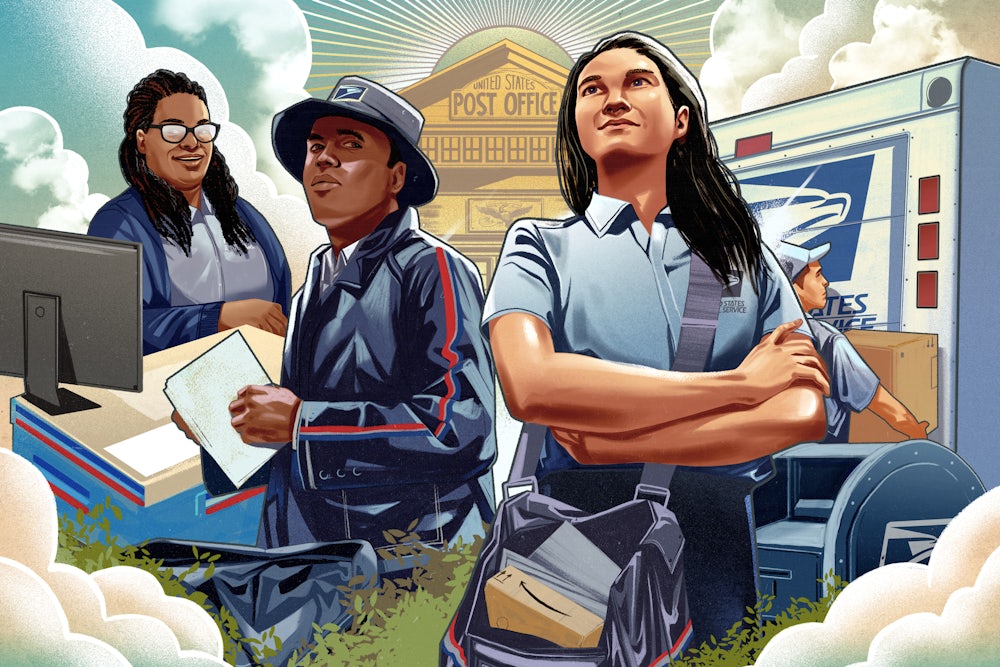If we’re lucky enough to see the derangements of the current era pass—such as the Trump administration and its farcical response to a once-in-a-century pandemic—the stewards of the next phase in American life have an awesome task ahead of them. They’ll need to author a new economic recovery and reboot the federal government; more likely than not, they’ll also need to find a way to restore the American people’s lost faith in institutions and forge a more equitable future. Simple action items are in short supply, but here’s one: a broad reimagining of the U.S. Postal Service.
USPS officials have beseeched lawmakers for a bailout during the pandemic, raising concerns that the agency could be insolvent by the autumn. In April, the White House put the kibosh on $13 billion worth of sustenance, even as it let far less worthy corporate interests fatten themselves on the Covid-19 bailout teat. (A bipartisan group of House lawmakers is even seeking to cut in predatory payday lenders on the bailout deal, in an apparent attempt to win the Nobel Prize for bottom-feeding.) Donald Trump has referred to the USPS as a joke and demanded, as a precondition for aid, that it charge Amazon higher rates—the better to stick it to its founder, Jeff Bezos, whose Washington Post, he believes, has been out to get him from the start.
Bezos can weather the collapse of the Postal Service, but the average American can’t. Right now, for hundreds of thousands strewn across the nation’s expanse, the Postal Service is their last real connection to their government. The loss of this vital intersection will only add to the isolation that so many people needlessly experience. There are already too many communities living as if they resided on a remote archipelago, rather than in a unified nation.
But we shouldn’t stop at merely providing the USPS with the $89 billion it has asked for. Rather, this is a moment when we can revitalize the agency and use it to restore our faith in America. The good old post office doesn’t have to simply be the place where we send letters. For millions of unbanked Americans, it can be a place where checks are cashed, bills paid, and loans provided. This isn’t a pie-in-the-sky plan. From 1911 to 1967, post offices were the venue for postal banking and a vital lifeline for those hit by the Great Depression; it can serve these needs again. Bernie Sanders, Elizabeth Warren, and Kirsten Gillibrand have all backed postal banking.
We can dream even bigger. The post office could be the place where Americans come to navigate the federal bureaucracy, an all-in-one kiosk for quick answers from human beings in a face-to-face setting. Whether it’s getting government-provided health insurance sorted out, or learning about available federal grants, the post office of the future would make things a little easier—after a visit, you’d tell your loved ones, “I talked to a guy; we took care of it.”
The Postal Service is already one of the most reliable employers of veterans—people who think big, and who have real experience traversing complicated bureaucracies. And since we’re already sending a lot of talent out into the nation, there’s no reason the USPS can’t be a future farm system for the federal government, where our most capable contenders can be called up to the majors, bringing with them a wealth of firsthand experience helping ordinary Americans surmount life’s inevitable challenges.
In a way, a revived, more ambitious Postal Service is a giant infrastructure project—only instead of laying asphalt or stacking concrete, it would deploy human potential and the spirit of civic duty. There’s really nothing radical or crazed about this idea, unless you’d call Benjamin Franklin, who was our first postmaster general, a crazed radical. It only demands that we start taking the way we imagine America could be in the best of times more seriously, by making use of what we already have close at hand.
